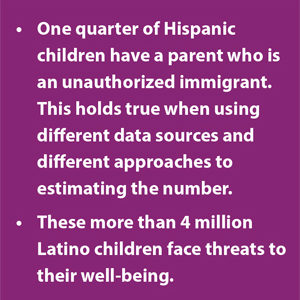By Eric Moreno
Salud America
Nearly 94% of the 18 million Latino kids living in the United States today were born here.
Their moms and dads are a different story.
About half of Latino kids have at least one parent who was born outside of the U.S., and about four million of these also have at least one parent who is not authorized to be in the country, according to new data from the National Research Center on Hispanic Children & Families.
The new data have big implications for the wellness of these children.
Immigration, Kids, and Mental Health
Living with the threat of deportation and the separation from a parent can harm a child.
 It may cause “fear or anxiety that can affect children’s physical and mental health, as well as their development,” the new data shows.
It may cause “fear or anxiety that can affect children’s physical and mental health, as well as their development,” the new data shows.
One in four Latino kids are at risk from the stresses associated with being forcefully separated from their parent/parents who are unauthorized immigrants.
This reality often leads to great amounts of stress on the entire family, which can be especially toxic for children. Toxic stress—defined as chronic, overwhelming stress—hampers the cognitive development of children and impairs their physical health.
“Should large numbers of parents be deported, states may be faced with placing their children in foster care, a public system that in most states is already overextended,” according to the new data.
Poverty makes the situation even more complicated.
The new data shows that children living with unauthorized immigrant parents disproportionately live in poverty than families with U.S. born-parents.
“Out of fear of drawing attention to their immigration status, their parents may not access public assistance programs designed to meet the needs of vulnerable children,” according to the data.
How Can We Help Children?
Program leaders, school leaders, and healthcare providers can ensure that mental health interventions for Latino children are sensitive to issues specific to this group, including bullying, acculturation, discrimination, and immigration-related factors.
“As our nation continues the important discourse about how to move forward on immigration policy, it is critical that we acknowledge the extent to which Latino children are disproportionately affected by these policies, and the potential impact of various policy alternatives on their short- and long-term well-being,” according to a report about the new data.
“This will matter not only for Latino children’s well-being, but also for the social and economic well-being of our nation.”



